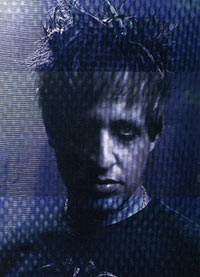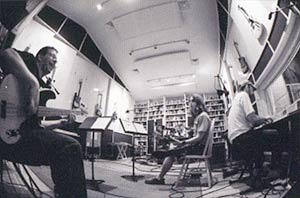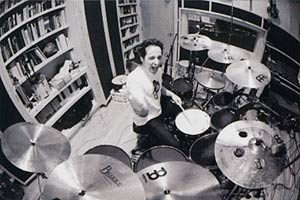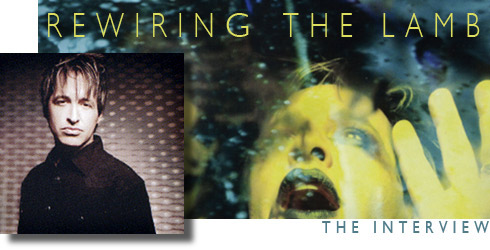- Article
- Read in 16 minutes
Nick DVirgilio – Rewiring Genesis – The interview about his Lamb project
In autumn 2008 Nick D’Virgilio surprised everybody with his own version of the legendary Genesis double album. The Lamb Lies Down On Broadway. Martin Klinkhardt spoke about the project with Nick.
genesis-news.com: I imagine it took some time to prepare this new version of The Lamb. When did you start working on Rewiring Genesis?
Nick: About a year ago or so, Mark and I … He lives in Nashville, Tennessee, which is about 2,000 miles from Los Angeles. We went there to record a different session. After the session was over he tried to record The Colony Of Slippermen. That’s what started this whole thing off. The song sat around for a good little while until we decided: “Why don’t we try and do the whole thing?” So that song sat around for some six months or so before we decided to do the rest of the album. But Mark and John Hinchey, the horn and string arranger, had already charted out the whole record before we started. That helped us a lot because they had all the music written down and waiting for us there until we needed it.
GNC: Why did you start with The Colony Of Slippermen? You could have chosen one of the classics like In The Cageinstead?
Nick: It was Mark’s idea. We were hanging out at a music convention. He is from Nashville, so he works with that kind of countrified music a lot. He just though it would be a crazy idea to record that song – it is one of his favourite songs on The Lamb – but doing it like a country version of it. That was his idea, because it is one of the crazier songs on the album. When we sat down with all the players it just turned out the way it did. Out of a weird, funny idea: What would it sound like if we did this? And that’s what happened.
GNC: Some tributes deconstruct the songs they cover while others, for example The Musical Box, try to remain as faithful as possible to the original. How did you approach your re-interpretation?
Nick: We just started jamming on the song to see how it felt like. These guys – only Don, the guitar player, had ever really heard this song or any of their music before. The bass player obviously knew of Genesis but didn’t know that record. He didn’t grow up with it like we all did. It was the same with the keyboard player, Jeff. That’s what kind of made it fun. We listened to the track a few times, and then they were down the sheet music and we just started playing. They were giving it a fresh feel just because they had never done it before. And they are really, really good musicians. They play their instruments really well. Once we started jamming, it just kinda really grew naturally.
 GNC: You said that most of the musicians did not know the music because they
GNC: You said that most of the musicians did not know the music because they
are probably more from the country music corner. What did they think of
the music?
Nick: They thought it was weird. The way the music is written – you know,
it’s still music, the way the chords are structured it is really normal
once you dig really deep into it. It wasn’t that out. Once we started
jamming they went “oh yeah, that feels good!” It’s not quite as weird
as it sounds when you listen back to the record. When you strip it down
to just the bass, drums and guitar, it’s not as crazy as it sounds when
everything comes together at the end.
it: But the end result is pretty crazy, isn’t it?
Nick: Oh yes, absolutely.
GNC: It is not at all a new thing that musicians cover songs. But covering a whole album is a bit unusual, isn’t it?
Nick: Totally. Like I said, we didn’t plan on doing this. We did the one song just for the fun of it because we happened to be in the studio all at the same time. Once the whole strings and horns and the whole song came together we listened to it and said “well, this sounds … great in our opinion.” – I mean to have an accordion play the solo – it’s hilarious, it put a smile on all of our faces, especially us old Genesis fans. No one had really had thought of it before. It wasn’t until this song was recorded and mixed that we went: “Do you think we could do the whole record like this?” We didn’t know if it could happen or not, but once we talked to John, the string and horn arranger guy, he said “Yeah, I think we could put something together.” And then the guitar player, Don, who is a big fan said “Let’s try it!” And then everybody started donating their time and doing things much cheaper than they would normally do. Dave Martin, the bass player, is also the studio owner, gave us the studio to use in lieu of getting paid later. Everybody volunteered their time to do this funky project just, you know, because! [laughs] Because the one song had turned out so well and had a special vibe to us, a special feeling so we decided to go for it. A crazy idea!
GNC: Why The Lamb? On Spock’s Beard V you gave Selling England as one of your favourite albums… Was it just because you happened to record The Colony Of Slippermen?
Nick: I think that’s probably the only reason, really. It is the concept, the story, you know, putting the same kind of sound on all songs, most of them at least. It was already a cohesive thing, the way the record sounds. I don’t know if it would be the same if we did Selling England because that is a bunch of separate songs.
GNC: This is actually not the first time you covered something from The Lamb. I think you played bits from The Lamb in 1994 with the late Kevin Gilbert. How much does Rewiring Genesis owe to that performance?
Nick: It doesn’t actually owe much to it, to be honest. That thing in 1994 was Kevin’s idea, that was the first gig I ever had with Kevin. Genesis was my favourite band and Phil my favourite drummer I had all that stuff memorized backwards and forwards so it was easy for me to jump in and play those songs. We did this just for the heck of it, there was really no plan. It surprised us, too.
GNC: Knowing all that music inside and out is very impressive, considering that Phil said he had some problems playing The Musical Boxwith the coverband The Musical Box in Geneva…
Nick: Yes, but that’s really tough, because he was a young kid back when he recorded all these songs, and back in those days, at least in my opinion, he was one of the greatest drummers on the planet. He played a lot of really difficult stuff! I remember reading him saying in an interview that he didn’t really know how he did certain things. He just played them and that’s what came out. To play those hard parts again now, twenty-five years later, when you haven’t practiced them in years and years is really difficult. There are some hard parts on The Musical Box, too, drumming-wise, some really fast and technical things…
GNC: Isn’t it quite as difficult to feel your way into another drummer’s way of playing?
Nick: For me it wasn’t too hard because, well, it was so long. He was such a big influence on my playing as a drummer that – the feel part of it I understood. And it wasn’t hard to figure out some of the parts. That’s probably why. It would be much harder for me to figure out some other music, like some old Frank Zappa where it gets even crazier than Genesis music.
 GNC: “Rewired” is an expression one frequently hears as the opposite of “unplugged”. But there are many acoustic, unplugged instruments on Rewiring Genesis. Then there is a Mike + The Mechanics album called Rewired. What was the idea behind calling this project Rewiring Genesis?
GNC: “Rewired” is an expression one frequently hears as the opposite of “unplugged”. But there are many acoustic, unplugged instruments on Rewiring Genesis. Then there is a Mike + The Mechanics album called Rewired. What was the idea behind calling this project Rewiring Genesis?
Nick: We were originally going to call it Rewired. This is a name Mark came up with. We made the name so that people would think that it was a reworking, not necessarily a complete change of the sound. That was the concept behind the name. It has nothing to do with the Mechanics thing, no.
GNC: In a conversation in our forum someone said: “Rewiring Genesis is a great album, great songs, but it is not a concept album anymore.” Is it?
Nick: It’s not a concept like they originally thought of it, I’m sure. We weren’t necessarily trying to go for that because – we didn’t write it, we were just recording it. I’m not sure we could get quite as close to the concept like Peter Gabriel did with writing that story. That came right from his soul, and we weren’t coming from that point. But we wanted to stay true to the story in the way we recorded certain songs and the emotions we gave certain songs. We didn’t try to take them to a completely new place. The Chamber Of 32 Doors is pretty close to the original, The Ravine and In The Rapids –we tried to really keep the emotion, or even add to it. I think we did a really good job with The Light Dies Down On Broadway. Adding the strings and the different sounds gave the song even a bit more emotion, at least in my opinion. So we tried to stay true to it for sure, but I don’t think we could get as close as the original because we didn’t write the original.
GNC: Were there songs you found more difficult to rearrange than others?
Nick: Sure! The Waiting Room was difficult, just putting the two pieces together. The beginning part with all the sound effects is one half, and then the music is the second half. You have to tie them together. The way that Phil Collins turns the beat around and all kinds of weirdness that happens in the second half was strange. Riding The Scree was obviously a hard one, especially for the horn players. The clarinet guy had never really soloed like that before in that time signature, so he was reading the music down note for note off the page, and he had to be kind of conducted in that weird time signature. That was difficult. In The Cage was certainly a beast. It wasn’t a beast as far as the playing was concerned. The playing and the drumming are hard technical parts, but that was the easiest stuff as I had already known it and grew up with it. Getting the whole thing arranged with the parts and the strings playing the solo in the middle… this whole thing was just a beast of a song. I think we had some 90 tracks of music when we were done with it. It was huge. We kept everything separate, we didn’t compile things down to stereo. Everything was separate and that made it a monster of a track by the time we got done with it.
GNC: I would think the ambient songs would have been quite difficult…
Nick: Oh yeah! I think Mark absolutely hates the song Silent Sorrow In Empty Boats because he had this idea – he wanted to make the choir sound, which is a mellotron sound on the original, all human voices. So he got his wife who sings on the record with me, Kat, and a few other singers in Nashville, and he tried to figure out what the players were playing on the original record, the timing of the notes and the chords – there is no real time, it sounds very random on the original. He had a very hard time with that one.
GNC: I assumed it would be difficult because there is not much happening musically, just some chords wafting around…
Nick: Exactly. He had to figure out to get it into some kind of rhythm so when he was recording the vocals so the singers would have some kind of rhythm to sing to, or it would have sounded very out. He had to do that and make it sound random when the thing was mixed.
GNC: You mentioned that most of the musicians on this album played from sheet music. Did they have some time to take the opportunity and listen to the original album beforehand, or did they just come in, play, have a coffee and go?
Nick: A lot of it was like that. They came in, had never heard this song before, listened to the tune five or six times and then start recording. To me, that’s what was really cool because these guys are really good musicians to make up new stuff like that. It was good that they hadn’t lived with it for that long. They were giving it a fresh feel, a fresh vibe that was working for the whole project. Especially some of the horn players, they just came in and did their job like they do all the time. They would come to recording sessions not knowing the music, be given the sheet music, play their part and go. It was kind of the same thing they did for this, although this was much harder music.
GNC: How long did it take to record this whole double album?
Nick: As I said, Slippermen was done. But from the point when we started it was seven and a half weeks. Mark put in a lot of time. We did a couple of long recording sessions. One was a week long, or six days and then one prior to that which was about three or four days just for bass, drums and guitar. And then all the overdub sessions, all the mixing and editing and all the other stuff, that was seven and a half weeks. We crammed it in there. It would have been nice to have more time, but we wanted to get it out.
GNC: The Grand Parade Of Lifeless Packaging is probably the song on The Lamb where Genesis sound most mechanical, like the assembly line. Where did you get the idea to turn it into a barbershop choir and percussion?
Nick: Yes, it’s only voice and percussion, no other instrumentation. I thought it would be a really cool song to do that with. I was sitting in my studio here experimenting with sounds and I got the basic song down, and it was just a fun thing to do. I sat down and listened to all parts many times over and tried to figure out how to recreate some of those keyboard sounds and the voice. Once Kat added her female voice over the top of all that everything came together.
 GNC: Another song I enjoy very much is Counting Out Time. It is a great moment when the clarinet comes in.
GNC: Another song I enjoy very much is Counting Out Time. It is a great moment when the clarinet comes in.
Nick: That was a thing of having the other musicians around and having their ideas come out. We were recording this in the studio and when we got to the middle of the song Dave, the bass player, goes: “Man, this would be perfect if we just broke into a complete Dixieland section right here!” Because we all wanted crazy things to happen we went: “Cool, sounds great!” When we recorded all the basics we didn’t have all the horns with us, just the four of us, so we played it as close to a Dixieland thing as we could. Once John added all the horns to it it was – gosh, right where we wanted it. – The song, the lyrics and the whole vibe of the song really lend itself to that. That is so cool about a lot of the music on this record: The way they wrote this music. Once you break it down to the basic form of the chords and the rhythms, it is very groovy R&B-ish kind of stuff. That is why some people take offence if you call it bluesy kind of stuff, but it really is. Once you get down to it, the chords and so fit that thing. That’s because of the way they wrote it. And that song fits it perfectly, I think.
GNC: Some people feel that this album sounds less like an album but a soundtrack or a musical. Have you thought about bringing it to the stage?
Nick: I have, yes. Now that it is all done I think it would work really well in that setting, so I’ll see where that takes … I’m not sure if we can make this happen or not, but it definitely would be fun for sure.
GNC: Perhaps even a movie? Peter Gabriel toyed with that idea in the 70s, after all. You are probably not going to tour with it, or are you?
Nick: There are no plans at this point. I guess it all depends on how well it sells and if there’s a demand for that kind of thing. Obviously, I would do it, no question. It would take a good chunk of change to be able to pull this off, to do it right. I guess we could do it with tracks and not have the real strings and horns on stage, but I don’t know if that would be as cool.
GNC: That would probably take away the fun. Perhaps a one-off concert?
Nick: Yes, that might happen.
GNC: Did you get any support from the Genesis camp for this album?
Nick: No, not yet. I’m going to London next month. I have a show opening up for another band, and I’m going to see if I can make my way to the offices there and see what they think about getting involved in some way, or at least putting their stamp of approval on it, how they like it or something. That would help. I don’t know if they’ve heard it, they probably have, but I’m going to make sure they all have copies at least by next month.
GNC: So I gather you haven’t had any feedback from them yet?
Nick: Not from them, no.
GNC: Did you attend their 2007 Turn It On Again tour?
Nick: Yes, I did. I saw them here in Los Angeles. Although they didn’t get to finish this concert because it rained. It hadn’t rained in Los Angeles for months and months and months, and it rained as hard as I had almost ever seen it. My wife and I sat together. The Genesis guys got us tickets, really nice seats. The Hollywood Bowl is a beautiful venue, and it was really cool. We were down close and watching this amazing show, and it pissed down, rained so hard that we were soaking wet from head to toe. The whole audience was. It was crazy.
GNC: Let’s talk about the cover. Who developed it and how do you like it?
Nick: It was the photographer. He shot the photos and also did the CD design. We gave him the whole vibe of the story line and the concept behind the album, and we wanted to have some kind of cover – we couldn’t copy the original because it illegal. But we wanted to have the same kind of thing with panels. There are three panels on the front of the original and they kind of vibe. He got the story and about the whole split personality thing. So we would put makeup on me and come up with it as the crazy side. It was his version of that.
GNC: Allow me one mean question – what do you think The Lamb is about?
Nick: It is obviously a weird Peter Gabriel vision. It is about this guy who is trying to find himself, he has a split personality and he is going through this whole adventure thinking he is trying to rescue his brother John when he is actually trying to rescue himself from his debauchery and his own crazy adventure kind of thing.
GNC: Which song are you most proud of, most happy with on this album?
Nick: There is a whole bunch. I really like the way Slippermen turned out, the reason we did this whole thing. It was so very special. The way Fly On A Windshield is and Broadway Melody. Broadway Melody was one the most fun songs to sing on this album. It has one of the greatest vocals of all time. Those two are big highlights for me. The way Hairless Heart turned out is just gorgeous, very pared down, just the piano and the jazzy-sounding drums. To me it is just so gorgeous. Uh… Counting Out Time and The Chamber of 32 Doors are big highlights for me. The guitar on The Supernatural Anaesthetist is a highlight… There is a lot!
GNC: Did you get the new box set with The Lamb Lies Down On Broadway yet?
Nick: I haven’t got it. I’m hoping Santa Claus brings it to me for Christmas. Mark has already got it and he says it sounds amazing.
GNC: You mentioned that you are probably not going to tour with it. How does this project affect the future of Spock’s Beard?
Nick: Spock’s is still doing their thing. We are in the very early stages of getting a new record started. It hasn’t taken away from that at all.
GNC: Nick, thank you very much for taking the time for this interview.
Nick: It was my pleasure.
Questions and transcription by Martin Klinkhardt

